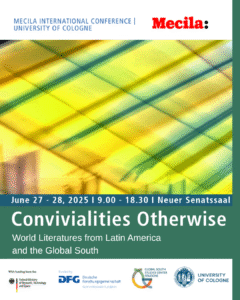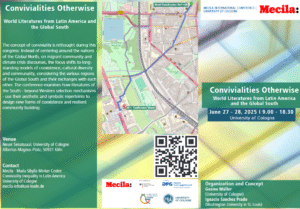UzK, Cologne
Mecila International Conference at UzK
27-28 June 2025, 09:00-18:30
University of Cologne (Main Building), Neuer Senatssaal, Albertus-Magnus-Platz, 50923
Languages: Spanish/English
Organizers: Gesine Müller (Universität zu Köln) and Ignacio M. Sánches Prado (Washington University , St. Louis)

About the event:
Notions of conviviality have a long history, and today are receiving more attention than ever before. The first conceptual definitions were formulated in Mexico in the 1960s and then postulated on a sociological level by Ivan Illich. Today the concept is in wide use, both as an analytical-descriptive category and as a programmatic idea. The discussion of conviviality often centers around the nations of the Global North, migrant community discourses, and issues related to climate change. Without denying the importance of these issues, a broader notion of conviviality could be theorized by additionally considering the various regions of the Global South and their exchanges with each other. Herein, there are long-standing models of give-and-take, coexistence, cultural diversity and communality. Exploring anew the possibilities and limits of the concept of conviviality in world literatures written from the South seems a promising approach in light of the much-cited crisis of the humanities— inasmuch as these literatures contain historical collections and conceptual and aesthetic formulations that allow us to consider this idea from fresh critical, geographical, and intellectual positions.
When we speak of “world literatures of the Global South” in this context, we do not refer to a selection of representative texts based, for example, on translation or other emphasizing mechanisms that have a clear western stamp. It is rather that the way in which literature represents the world provides a new opportunity for work in the comparative field. Therefore, it becomes necessary to explore in a fully-conscious manner the multiple symbolic repertoires that go into the construction of a world— repertoires that go beyond concrete material and institutional limits in their international circulation. In this way, different constellations of conviviality, which can be taken as the literary study of the conditions of community, resilience, and coexistence within fictional worlds, can be analyzed in their similarities and differences, their historical roots, and their innovative potential. At the same time, a comparative perspective on the literatures of the Global South offers perspectives that are able to decentralize the practice of comparison and replace certain hegemonic models without constantly having to resort to the antagonism between center and periphery, North and South.
This question is the point of departure for our conference: How can we fruitfully present the staging of conviviality in the literatures of the Global South and, from there, arrive at conceptual forms that allow us to theorize global social practices? The fact that the focus of the planned congress is on a comparative study of the literatures of the Global South is due, above all, to the fact that texts from these regions have creatively articulated different variants of conviviality at different levels— local, global, and planetary. The literature of the Global South has postulated forms of living and existing that, in a condensed and dramatic manner, creatively negotiate the concrete problems of conviviality.
In the case of Latin America, we start by approaching the complex consequences of the longue durée processes of globalization, which have been part of the continent’s organization since 1492. The heterogeneity of Latin American literatures and their dialogues with and from the Global South allow us to think beyond the concept of “semi-peripheral” literatures to refer to postcolonial regions, emphasizing cultural ecosystems structured at transnational and multilingual levels, with no inherent relation to the Global North or the structures of imperialism, even while the literary output in the Global South maintains a fraught relationship to the global literary system due to the use of imperial languages.
It is also worth considering the long tradition of Latin American thinking that has theorized the problems of conviviality and conflict in the multiple layers within zones of local and global contact. This congress seeks dialogue and debate on the ways in which these conceptual paradigms might help us advance or debate the notion of conviviality. In the 21st century, historically-important terms such as transculturation, heterogeneity, neo baroque, hybridity, and cultural mixing have been complemented by new vocabulary that accounts for both the flows of global exchange and the recognition of the problems of coexistence within contemporary nation states. Among them we encounter terms like coloniality, pluriculturality, border fluidity, Latin-Africa, Améfrica Latina, communality, tequío, and chi’xi world.
This congress also seeks to think about the way in which the problems of conviviality emerge from four themes: the complex literary and cultural relations of Latin America with other regions of the Global South; the pluricultural orientation of Latin American literatures that has emerged as a consequence of the growing strength and visibility of indigenous and afro-descendant literatures; the recognition of diasporic Latin American literatures around the world; and the centrality of gender and sexuality issues in the region’s social and cultural movements.

Full Programme:
27 de Junho
09.00-09.15: Welcoming, Barbara Potthast
09.15-09.30: Introduction, Gesine Müller/Ignacio Sánchez Prado
Convivialities in the Global South: Crossings, Relationalities, and Transformations
09.30-09.50: Ignacio Sánchez Prado (Washington University in St. Louis): “De la convivialidad a la heteronomía. Orientaciones estéticas hacia el Sur Global”
09.50-10.10: Sarah Quesada (Duke University): “Latin- African Ethnographies or the Practice of South-South Familiarity”
10.10-10.30: Paulo Lemos Horta (New York University Abu Dhabi): “‘Southern Hemisphericals’: Mapping Conviviality between Latin American and South Asian Literatures in London Publishing”
10.30-11.00: Discussion
11.00-11.30: Break
11.30-11.50: Gesine Müller (Cologne/Mecila):“Convivialities Otherwise. Ejemplos literarios posglobales de Bolivia, Yibuti y Mauritius”
11.50-12.10: Estefania Bournot (Innsbruck): “African Returns: Literary Crossings and Diasporic BiLongings in the South Atlantic”
12.10-12.30: Santiago Vaquera-Vasquez (University of New Mexico): “Apuntes Fronterizos: Encuentros transamericanos”
12.30-13.00: Discussion
Conviviality in Times of Crisis: Colonialism, Current Challenges, and Future Pathways
14.30-14.50: Silvana Mandolessi (Leuven): ”Colonialism Revisited: Convivial Figurations in Gabriela Cabezón Cámara’s Las niñas del naranjel”
14.50-15.10: Jobst Welge (Leipzig): “Convivir en la Casa Grande: Esclavitud, familia y comunidad en la novela gótica sureña y brasileña (W. Faulkner; C. Penna)”
15.10-15.30: Jorge J. Locane (Oslo): ”Conviviality o quilombo”
15.30-16.00: Discussion
16.00-16.30: Break
16.30-16.50: Jan-Henrik Witthaus (Kassel): “Liberalismo económico y solidaridad femenina. El caso de la novela 44 horas semanales (1936) de Josefina Marpons”
16.50-17.10: Alain Álvarez Vega (Cologne/ Ciudad de México): “(Des)Integrarse: exclusión y barbarie del modelo integracionista occidental en la obra de Louisa Yousfi y Juan Pablo Villalobos”
17.10-17.30: Anne Garland Mahler (University of Virginia): “Relational Poetics: The Anti-Imperialist League of the Americas and Regino Pedroso’s Afro-Chinese-Cuban Writings”
17.30-17.50: Ottmar Ette (BBAW Berlin/HCTS Changsha): “Living Together in Times of War and Violence: Latin America’s Literatures of the World”
17.50-18.30: Discussion
19.30 Conference Dinner
June 28
Shaping Relationalities: Sociological, Philosophical, and Literary Perspectives on Conviviality
09.00-09.20: Gloria Chicote (UNLP, Conicet / Mecila): “Visitando el archivo de Ivan Illich: Lengua y literatura como estrategias de convivialidad social”
09.20-09.40: Magalí Armillas-Tiseyra (Pennsylvania State University): “Filaments: Recognition, Interconnection, and Other Forms of ‘Global’ Thinking in Contemporary Latin American Writing”
09.40-10.00: Christoph Müller (IAI Berlin / Mecila): ”Literatura afrocolombiana: representaciones literarias de convivialidad y desigualdad entre África, el Caribe y América del Sur”
10.00-10.30: Discussion
10.30-11.00: Break
11.00-11.20: Christina Soto van der Plas (Utrecht): “Por una poética de la cura: escribir lo ausente y construir lo común”
1.20-11.40: Susanne Klengel (FU Berlin / Mecila): “¿Sur global y/o Oriente? Reflexiones sobre la convivialidad Sur/Sur a partir de la antología Pasaje al Oriente. Narrativa de viaje de escritores argentinos (Buenos Aires, 2009)”
11.40-12.00: Moacyr Novaes (Universidade de São Paulo / Mecila): “Big big grammar. Can Philosophy learn from Literature?”
12.00-12.30: Discussion
12.30-13h: Break
Rethinking Convivial Constellations: Community Building and Resilience
14.30-14.50: Gustavo Guerrero (CY Cergy Paris Université): “Ficciones de la comunidad: la crisis del vivir juntos en tres novelas latinoamericanas del siglo XXI”
14.50-15.10: Rebecca Janzen (University of South Carolina): “La convivialidad en la representación de la religión en la obra de Fernanda Melchor”
15.10-15.30: Benjamin Loy (Munich): “Convivialidad en la Venezuela actual: migración y comunidades afectivas en Simpatía de Rodrigo Blanco Calderón”
15.30-16.00: Discussion
16.00-16.30: Break
16.30-16.50: Anne Kraume (Constance): “Sembrar en el desierto. Infraestructuras de la convivialidad en Autobiografía del algodón de Cristina Rivera Garza”
16.50-17.10: Jan Knobloch (Cologne): “La ausencia del otro. Negación y comunidad en la poesía de Alejandra Pizarnik”
17.10-17:30: Bieke Willem (Cologne): “La convivialidad como encuentro y tropiezo de las aguas: Lo champurria y el imaginario insular en Chilco (2023) de Daniela Catrileo”
17.30-17.50: Héctor Hoyos (Stanford University): “Decrecimiento y pacificación en la novela latinoamericana contemporánea”
17.50-18.30: Discussion
The pdf flyer of the event can be found here.
For further information, please contact mecila-info@uni-koeln.de or access Mecila International Workshop ‘Convivialities Otherwise’.